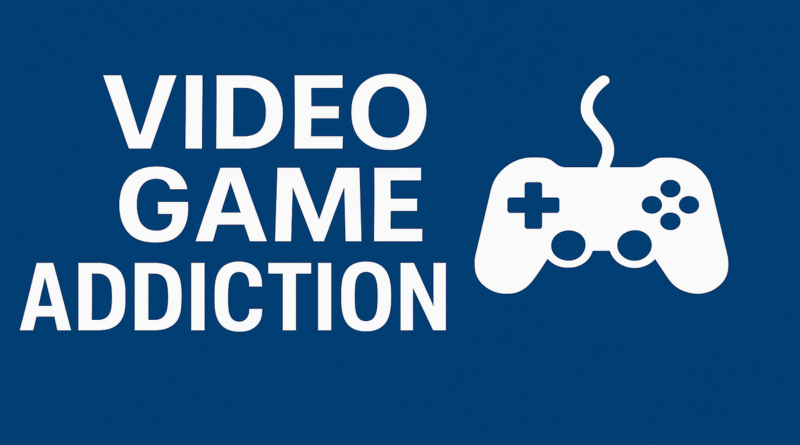Video Game Addiction: Understanding, Effects, and Solutions
Video games have become an integral part of modern entertainment, offering immersive experiences, social connectivity, and even professional career opportunities. However, for some individuals, gaming can spiral into an uncontrollable habit, leading to what is known as video game addiction. This phenomenon has raised significant concerns among psychologists, educators, and parents worldwide. In this article, we will explore video game addiction, its effects, causes, and possible solutions while maintaining an SEO-optimized approach to ensure valuable insights for readers.
What is Video Game Addiction?
Video game addiction refers to the excessive and compulsive use of video games, leading to negative consequences in an individual’s personal, academic, social, and professional life. It is often categorized under Internet Gaming Disorder (IGD), recognized by the World Health Organization (WHO) and the American Psychiatric Association (APA). Individuals suffering from this addiction find it difficult to control their gaming habits, prioritizing virtual experiences over real-world responsibilities.
Signs and Symptoms of Video Game Addiction
Recognizing the signs of video game addiction is crucial for early intervention. Some common symptoms include:
- Preoccupation with gaming – Constantly thinking about video games, even when not playing.
- Loss of control – Inability to limit gaming time, despite efforts to do so.
- Neglecting responsibilities – Ignoring school, work, or household chores due to gaming.
- Withdrawal symptoms – Experiencing irritability, anxiety, or sadness when unable to play.
- Lying about gaming habits – Hiding gaming time from friends, family, or colleagues.
- Escaping real-life problems – Using gaming as a coping mechanism for stress or depression.
- Neglecting personal health – Ignoring meals, sleep, or physical activity due to prolonged gaming sessions.
- Loss of interest in other activities – Preferring gaming over hobbies, social events, or outdoor activities.
- Strained relationships – Conflict with family or friends due to excessive gaming.
Causes of Video Game Addiction
Several factors contribute to the development of video game addiction. These include:
1. Psychological Factors
- Dopamine Release: Video games trigger dopamine release, creating a pleasurable experience that encourages prolonged play.
- Escapism: Many individuals turn to gaming as a way to escape stress, anxiety, depression, or real-life problems.
- Reward System: The achievement-based system in video games keeps players engaged, constantly striving for the next goal.
2. Social Factors
- Online Community: Multiplayer games foster social connections, making players feel part of a larger community.
- Peer Pressure: Friends who play video games extensively may influence others to do the same.
- Loneliness: People who lack social interactions may resort to gaming as a means of companionship.
3. Game Design Mechanics
- Microtransactions and Loot Boxes: These encourage continuous engagement by offering rewards in exchange for time or money.
- Infinite Playability: Open-world and online multiplayer games lack a definitive ending, making it easy to get hooked.
- Daily Challenges and Streaks: Many games offer daily rewards to encourage continuous play.
Effects of Video Game Addiction
The impact of video game addiction extends beyond gaming itself, affecting multiple aspects of an individual’s life:
1. Physical Health Issues
- Obesity: Sedentary gaming habits contribute to weight gain and related health problems.
- Sleep Deprivation: Late-night gaming results in inadequate rest and poor concentration.
- Carpal Tunnel Syndrome: Repetitive hand movements can lead to nerve damage and pain.
2. Mental and Emotional Health Issues
- Increased Anxiety and Depression: Excessive gaming can worsen pre-existing mental health conditions.
- Aggression and Mood Swings: Violent video games may contribute to aggressive behavior.
- Low Self-Esteem: Failure in real-life situations due to gaming addiction can lead to self-doubt and insecurity.
3. Academic and Professional Decline
- Poor Academic Performance: Students who spend excessive time gaming often struggle with grades and assignments.
- Workplace Issues: Employees addicted to gaming may neglect work responsibilities, leading to job loss.
4. Social Consequences
- Isolation: Excessive gaming reduces face-to-face interactions and weakens real-life relationships.
- Conflict with Family and Friends: Disagreements over gaming habits can lead to strained relationships.
Solutions and Treatment for Video Game Addiction
Overcoming video game addiction requires self-discipline, awareness, and in some cases, professional intervention. Here are some effective solutions:
1. Setting Time Limits
- Use apps or alarms to regulate gaming time.
- Follow the 20-20-20 rule: For every 20 minutes of gaming, take a 20-second break to look at something 20 feet away.
2. Engaging in Alternative Activities
- Encourage hobbies like reading, sports, or music.
- Spend quality time with family and friends.
3. Seeking Professional Help
- Cognitive Behavioral Therapy (CBT) can help modify addictive behaviors.
- Support groups like Online Gamers Anonymous provide peer assistance.
4. Parental Control and Guidance
- Parents should monitor gaming habits and encourage outdoor activities.
- Implement reward systems for reducing screen time.
5. Digital Detox
- Take a break from gaming for a week or month to reset habits.
- Use this period to focus on personal development and real-life relationships.
6. Mindfulness and Meditation
- Practices like yoga and meditation can reduce stress and improve self-control.
Video Game Addiction Lawsuit: Legal Battles Over Gaming Dependency
In recent years, lawsuits related to video game addiction have gained traction as more people recognize the psychological and financial consequences of excessive gaming. Some lawsuits have targeted game developers, accusing them of creating deliberately addictive mechanics such as loot boxes, microtransactions, and endless gameplay loops. Parents have also filed legal actions against gaming companies, blaming them for their children’s compulsive gaming behaviors. Courts worldwide are debating whether gaming addiction should be classified similarly to gambling addiction, with legal accountability for the gaming industry.
Recognizing Video Game Addiction Symptoms: Warning Signs to Watch For
Understanding video game addiction symptoms is crucial in identifying problematic gaming behaviors before they escalate. Common symptoms include excessive gaming time, neglecting personal hygiene, disrupted sleep patterns, and social isolation. Additionally, individuals struggling with it may show withdrawal symptoms, such as irritability and anxiety when they are unable to play. Recognizing these signs early can help prevent long-term negative consequences and encourage intervention strategies.
Effective Video Game Addiction Treatment: How to Overcome Gaming Dependency
Overcoming video game addiction requires a combination of self-discipline, therapy, and structured interventions. Cognitive Behavioral Therapy (CBT) has been proven effective in modifying addictive behaviors and promoting healthier habits. Support groups and digital detox programs also provide individuals with the necessary guidance to regain control over their lives. Encouraging alternative activities, setting strict time limits, and fostering real-life social interactions are some of the most effective treatment methods.
How Do Video Games Show Signs Similar to Addiction? Understanding the Psychological Impact
Many studies have shown that video games can exhibit addictive properties similar to substances like drugs and alcohol. The release of dopamine during gameplay creates a cycle of reward and reinforcement, making players crave continuous engagement. Additionally, the game design often incorporates psychological tricks, such as variable rewards and competition, which keep players engaged for extended periods. Understanding these similarities is essential for recognizing and addressing video game addiction effectively.
Video Game Addiction Lawsuit Payout: What Victims and Families Need to Know
As lawsuits against gaming companies gain traction, discussions around video game addiction lawsuit payouts have become more prominent. Courts may award compensation to families affected by extreme gaming dependency, particularly if game developers are found liable for promoting addictive behaviors. These legal battles raise important ethical questions about corporate responsibility and consumer protection in the gaming industry.
Is Video Game Addiction Real? Debunking Myths and Understanding the Facts
Despite ongoing debates, scientific research supports the idea that video game addiction is real. Studies conducted by mental health professionals and organizations like the WHO and APA have classified excessive gaming behavior as a legitimate disorder. While not everyone who plays video games becomes addicted, recognizing the potential dangers and maintaining a balanced approach to gaming is essential for overall well-being.
Conclusion
Video game addiction is a growing concern in today’s digital world. While gaming itself is not inherently harmful, excessive and uncontrollable gaming can lead to serious consequences. Recognizing the signs, understanding the causes, and implementing solutions are crucial in overcoming this addiction. By balancing gaming with real-life responsibilities, individuals can enjoy video games without compromising their mental, physical, and social well-being.
If you or someone you know is struggling, seeking professional guidance and adopting healthier habits can make a significant difference. Remember, moderation is the key to enjoying video games responsibly.
You May also Read: Internet Gaming in DSM-5: Understanding Its Implications and Diagnosis




